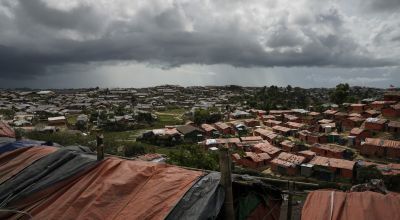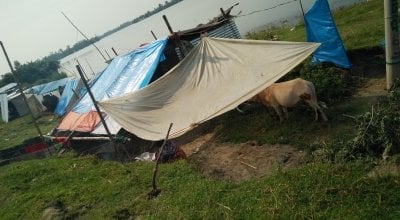
Read our 2024 annual report

Knowledge Hub
Three Rohingya refugees share their stories of escape and survival
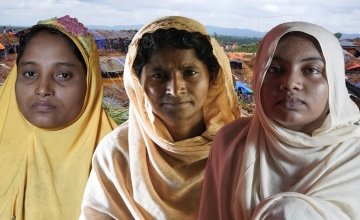
Over 900,000 Rohingya refugees fled violence in Myanmar and sought refuge in Bangladesh. Three of these refugees have shared their stories with us.
Background to the crisis
Since August 2017, over 900,000 Rohingya refugees have poured into the Cox’s Bazar area of south east Bangladesh to escape violence in Rakhine State, Myanmar.
According to ACAPS, a leading organisation on global crisis data, the hygiene, nutrition, and health situation for these people is extremely poor. The ongoing measles outbreak and high malnutrition rates are leaving children particularly vulnerable.
Further threats
The impending monsoon season poses further threats to hundreds of thousands of Rohingya refugees living in tents of bamboo and tarpaulin, renewing fears of flooding, mudslides, water-borne diseases and further displacement.
Morning Ireland visits Concern Worldwide camp for Rohingya refugees in Bangladesh
Meet Lukia
Lukia* (18) grew up in the Jalipara region of Rakhine State with her three sisters and brother. Her father was a fisherman, who provided for her whole family. They had no land or livestock but lived peacefully and could even afford to eat meat two or three times a month. She was married for just one week before the conflict broke out.
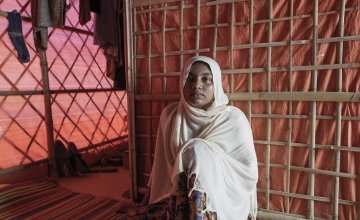
Lukia was not inside her family home when it was attacked by the Myanmar army, who used a rocket launcher to set it on fire. Her parents, brother and husband sadly were and died instantly. Lukia managed to escape her village without capture and spent two days walking to safety with her neighbours, who also suffered loss at the hands of the Myanmar army.
After they arrived at a river, they hoped to get a boat to safety, but Lukia was denied access, since she had no money to pay the boatmen. At this point, Lukia hadn't eaten for two days and had no choice but to stay and wait in a tent with strangers for almost two weeks.
During this time, Lukia managed to send information on her whereabouts to her eldest sister, who had already fled to safety in Bangladesh. It didn’t take long for her sister and nephew to reach the border and bring her with them by boat. Despite this, Lukia still feared the Myanmar army would capture her. Those fears didn’t subside until she finally reached the refugee camp safely.
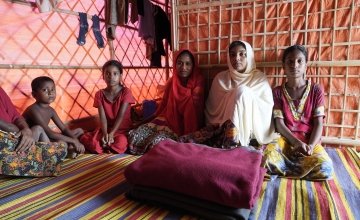
Upon arrival, Lukia was given mats, blankets, soap and a water container from Concern Worldwide. Although Lukia feels safe in the camp, she’s not allowed to work, so she receives no income. She only eats rice, daal and, on occasion, dried fish. She dreams of returning home to Myanmar when the bitter conflict ends. Until then, she is grateful for the safety and care that she is provided in the camp.
Meet Shaju
Shaju*, from the Maungdaw area of Myanmar, was just 13-years-old when she lost her mother and father. She lived with her older sister and worked as a housemaid while her husband worked as a day labourer. Unfortunately for Shaju, her struggles only worsened when she saw Myanmar army soldiers arrive in her village.
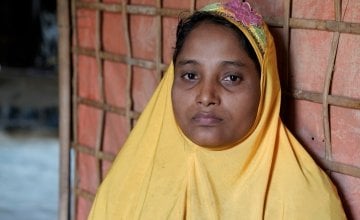
Young Rohingya men tried to protect the village, but during the conflict, Shaju's husband was caught and arrested by the army.
He was blindfolded and killed in front of their home. Shaju watched in horror from the temporary safety of a neighbour's house. From there, she ran to her sister's home, where she stayed for three days while trying to come to terms with what happened.
They soon realised that they were no longer safe in Maungdaw, so they traveled towards the River Naf. The pair waited on the river banks without food for two days before a boat arrived. Without money to pay for the crossing, Shaju was forced to use her wedding earrings as payment.
Now safely in the camp and receiving assistance from Concern, Shaju and her sister are grateful for their safety. Like Lukia, they received sleeping mats, blankets, soap and a water container. Although she is still grieving for her husband and remains terrified of loud noises, Shaju hopes to return to a conflict-free Myanmar and start her life again.
Meet Menara
Menara* (40) and her eight children are from Rakhine's Buthidaung area. Her husband worked as a farmer on their own land, which meant they never went hungry. The first time Menara saw the conflict was when the Myanmar army burned down her neighbours homes. She and her husband decided the best course of action was to flee the area, abandoning all their belongings.
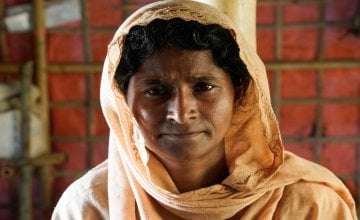
Menara's family walked for 16 days and slept in the jungle under polythene papers at night. They collected rice from other abandoned houses and cooked it in a small stove which they made on the roadside. Whenever the family tried to use a main road, the Myanmar army would fire blanks at them to force them back into the jungle.
Once they reached the border, they had finally arrived safely in Bangladesh. Now in Concern's care, the family each received sleeping mats, blankets, soap and a water container. Although her younger children are still recovering from the horrors they have seen, they are back to playing games around the camp.
*Names have been changed to protect identities.
You can help
With the impending monsoon season approaching, Concern is scaling up and adapting its emergency response activities to meet the needs for shelter, health, and nutrition. Please give what you can.




